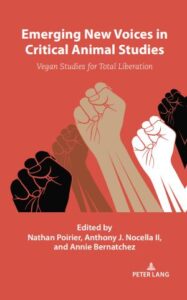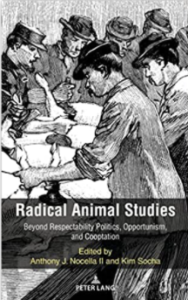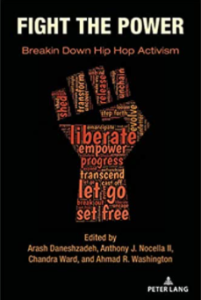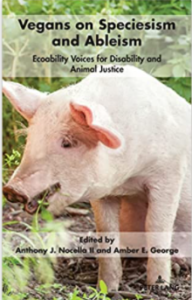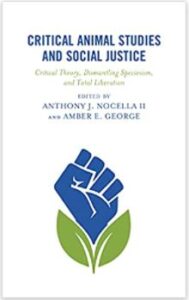Brill Book Series
Brill Book’s “Critical Animal Studies Book Series”
 In alignment with a key emphasis of other Brill Book’s (which bought out Rodopi Books) book series, Critical Animal Studies Book Series, a project of the Institute for Critical Animal Studies, challenges animal studies and research exploitation of nonhuman animals, by linking theory to practice and practice to theory and emphasizing the immense importance of animal advocacy for a humane, democratic, peaceful, and sustainable world. Critical Animal Studies Book Series, founded in 2009 by Anthony J. Nocella II is interdisciplinary and intersectional with an emphasis on total liberation and freedom for all. This Series was designed to build up the common activist’s knowledge of animal liberation while at the same time appealing to academic specialists to address the important topic of animal liberation, rights, freedom, and advocacy.
In alignment with a key emphasis of other Brill Book’s (which bought out Rodopi Books) book series, Critical Animal Studies Book Series, a project of the Institute for Critical Animal Studies, challenges animal studies and research exploitation of nonhuman animals, by linking theory to practice and practice to theory and emphasizing the immense importance of animal advocacy for a humane, democratic, peaceful, and sustainable world. Critical Animal Studies Book Series, founded in 2009 by Anthony J. Nocella II is interdisciplinary and intersectional with an emphasis on total liberation and freedom for all. This Series was designed to build up the common activist’s knowledge of animal liberation while at the same time appealing to academic specialists to address the important topic of animal liberation, rights, freedom, and advocacy.
Taking an interdisciplinary approach to questions of social change, moral progress, and ecological sustainability, the Critical Animal Studies Book Series will connect with a broad range of disciplines such as Women’s studies, globalization, economics, queer and trans studies, science, disability studies, history, environmental studies, ethnic studies, media studies, political science, sociology, religion, anthropology, philosophy, and cultural studies.
- Please promote this Book Series by printing off the Call for Proposals flyer and posting it up at community centers, schools, and universities: Call for Book Proposals
___________________________________________________________________________
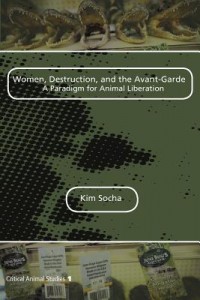 Critical Animal Studies Book 1:
Critical Animal Studies Book 1:
Women, Destruction, and the Avant-Garde: A Paradigm for Animal Liberation, By Kim Socha
This interdisciplinary study fuses analysis of feminist literature and manifestos, radical political theory, critical vanguard studies, women’s performance art, and popular culture to argue for the animal liberation movement as successor to the liberationist visions of the early twentieth-century avant-gardes, most especially the Surrealists. These vanguard groups are judiciously critiqued for their refusal to confront their own misogyny, a quandary that continues to plague animal activists, thereby disallowing for cohesion and full recognition of women’s value within a culturally marginalized cause.
This volume is of interest to anyone who is concerned about the continued—indeed, escalating—violence against nonhumans. More broadly, it will interest those seeking new pathways to challenge the dominant power constructions through which oppression of humans, nonhumans, and the environment thrives. Women, Destruction, and the Avant-Garde ultimately poses the animal liberation movement as having serious political and cultural implications for radical social change, destruction of hierarchy and for a world without shackles and cages, much as the Surrealists envisioned.
___________________________________________________________________________
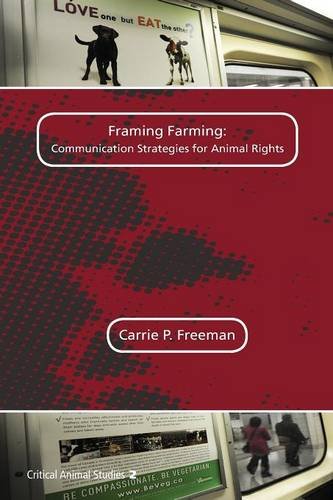 Critical Animal Studies Book 2: Framing Farming: Communication Strategies for Animal Rights, by Carrie P. Freeman
Critical Animal Studies Book 2: Framing Farming: Communication Strategies for Animal Rights, by Carrie P. Freeman
To what extent should animal rights activists promote animal rights when attempting to persuade meat-lovers to stop eating animals?
Contributing to a classic social movement framing debate, Freeman examines the animal rights movement’s struggles over whether to construct farming campaign messages based more on utility (emphasizing animal welfare, reform and reduction, and human self-interest) or ideology (emphasizing animal rights and abolition). Freeman prioritizes the latter, “ideological authenticity,” to promote a needed transformation in worldviews and human animal identity, not just behaviors. This would mean framing “go veg” messages not only around compassion, but also around principles of ecology, liberty, and justice, convincing people “it’s not fair to farm anyone”.
Through a unique frame analysis of vegan campaign materials (from websites, to videos, to bumper stickers) at five prominent U.S. animal rights organizations, and interviews with their leaders, including Ingrid Newkirk and Gene Baur, Freeman answers questions, such as: How is the movement defining core problems and solutions regarding animal farming and fishing? To which values are activists appealing? Why have movement leaders made these visual and rhetorical strategic choices – such as deciding between appealing to human self-interest, environmentalism, or altruism? To what extent is the animal rights movement actually challenging speciesist discrimination and the human/animal dualism?
Appealing to both scholars and activists, Framing Farming distinctively offers practical strategic guidance while remaining grounded in animal ethics and communication theory. It not only describes what 21st century animal rights campaigns are communicating, it also prescribes recommendations for what they should communicate to remain culturally resonant while promoting needed long-term social transformation away from using animals as resources.
___________________________________________________________________________
Submission Guidelines:
We accept proposals, not full manuscripts. We will accept with your proposal one sample chapter.
Proposals should include the following 12 areas:
- Cover sheet with title, name and contact information of author(s)/editor(s): address, phone-number, website, e-mail, and affiliations.
- Table of contents. In the case of a collection of essays by different authors around a central subject, add the contributors’ affiliations.
- Each chapter should have a 300 word about abstract interwoven in the Table of Contents.
- Introduction/overview of the book. This text should center on your book’s subject and give an idea of how that subject is developed or from which perspective/s it is being approached.(max. 2 pages)
- Whenever relevant, provide information about illustrated material or any other special graphic features that might be required.
- Originality versus marketplace competition: list recently published books that would compete with yours and, if possible, provide a synopsis of one to two sentences describing each. Mention how your proposed book will be different from the other titles. (max. 1 page)
- Target audience: marketing information describing the prospective readership for your book and how you will market the book. (max. 1 page)
- Your typescript. If already completed, specify the total number of words, including index, references and all other sections. If your project is in progress, give us an estimated date of completion and delivery, and approximate total length.
- Author(s)/editor(s) qualifications
- Author(s)/editor(s) biographies (200 words each)
- Contributor(s) biographies (200 words each)
- To provide a deadline that the full-manuscript that is type-set will be submitted
___________________________________________________________________________
Step 1. Proposal Submissions will be assigned to one of the four following categories:
- Accept without revisions
- Accept with editorial revisions
- Revise and resubmit for peer review
- Reject
- Every effort will be made to inform authors of the editor’s decision within 30 days of receipt of a proposal.
If approved by both, the Rodopi Press will invite you to submit the full manuscript for consideration with a contract sent to you. The manuscript will be reviewed by members of the editorial board and/or by external reviewers. Once you have sent us the manuscript, the subsequent period of consideration by the editorial board is approximately three months. If your manuscript is accepted for publication, the Publisher will contact you about contract formalities as well as about any revisions needed.
___________________________________________________________________________
Step 2. Full Completed Manuscript Submissions will be assigned to one of the four following categories:
- Accept without revisions
- Accept with editorial revisions
- Revise and resubmit for peer review
- Reject
- Every effort will be made to inform authors of the editor’s decision within 30 days of receipt of a manuscript.
___________________________________________________________________________
Please note:
- We request that you send the complete manuscript only upon invitation from the Publisher or a corresponding editor, completed and type-set.
- During this period we expect you to refrain from simultaneous or multiple submissions to other publishers.
- You can help us process your proposal if you adhere to the standard format of submission described above.
___________________________________________________________________________
Step 3. Please submit book proposals with sample chapter to each of the following:
- Dr. Helena Pedersen
Co-Senior Editor, Submissions and Review Process
Stockholm University
helena.pedersen@buv.su.se
- Vasile Stănescu
Co-Senior Editor, Promotions and Outreach
Mercer University
stanescu_vt@mercer.edu
Upon receipt, we will forward your full proposal to the Editorial Review Board of the Critical Animal Studies Book Series (see below) for consideration. It will take approximately a month for the board to decide whether to proceed with your proposal. We will then submit it to the Publisher (Rodopi Press) for an additional review process.
___________________________________________________________________________
Editorial Review Board
- Dr. Stephen R. L. Clark
University of Liverpool, England
srlclark@liverpool.ac.uk - Dr. Amy J. Fitzgerald
University of Windsor, Canada
afitz@uwindsor.ca - Dr. Anthony J. Nocella II
Hamline University, United States
nocellat@yahoo.com - Dr. Richard Twine
Lancaster University, England
r.twine@lancaster.ac.uk - Dr. Richard J. White
Sheffield Hallam University, England
Richard.White@shu.ac.uk
___________________________________________________________________________

